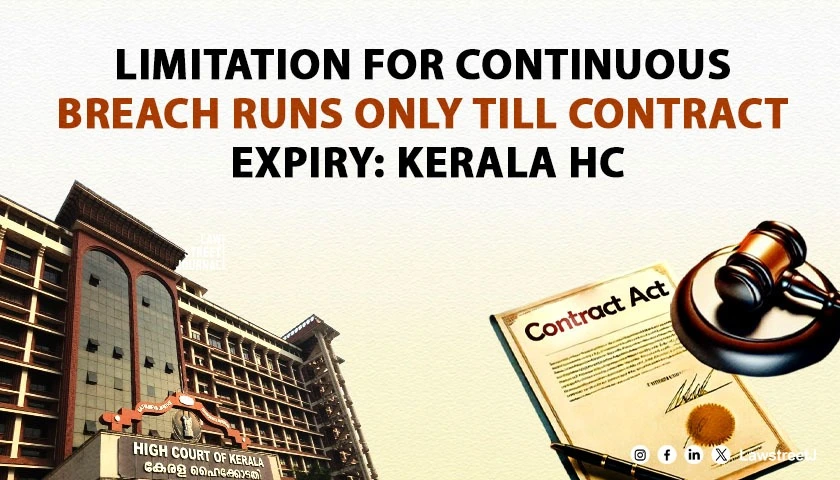Kerala: The Kerala High Court has held that in cases of continuous breach of contract, the limitation period under Article 55 of the Limitation Act, 1963 begins to run from the date the breach ceases, emphasizing that once the contract period expires, the breach cannot be said to continue thereafter.
The Division Bench comprising Justice Sathish Ninan and Justice P. Krishna Kumar delivered this significant clarification while addressing RFA No. 79 of 2013, which arose from a timber-cutting contract dispute between V. Chandran, a timber merchant, and the defendants, Aliamma George and others.
The court examined a case where the plaintiff entered into an agreement dated August 6, 1998 (Ext.A1) with the defendants to cut and remove trees from the defendants’ property for a total consideration of ₹25 lakhs. The court noted, “It was a term of Ext.A1 that the defendants were to obtain passes from the Forest Department to enable the removal of the trees.”
The original contract period was one year commencing from September 1, 1998. The plaintiff claimed he constructed a motorable road spanning 25 kilometers through the property and incurred substantial expenses for stacking sheds and labor arrangements. He alleged that due to the defendants’ failure to procure necessary forest passes, the agreement was extended until April 3, 2001, and sought damages for being unable to completely remove the trees.
The defendants admitted the existence of the Ext.A1 agreement but contended that it had been fully performed, and that another agreement (Ext.B4) was subsequently entered into on October 1, 2000, for the removal of trees from a different property. The trial court dismissed the plaintiff’s suit filed on January 18, 2005, finding it barred by limitation.
Justice Sathish Ninan, writing for the Division Bench, extensively analyzed Article 55 of the Limitation Act, 1963, which provides three years as the limitation period for compensation for breach of contract. The court quoted the Article, which states the limitation period begins to run “when the contract is broken or (where there are successive breaches) when the breach in respect of which the suit is instituted occurs or (where the breach is continuing) when it ceases.”
The court emphasized that Article 55 contemplates three distinct situations: “one, when the contract is breached; second, when there are successive breaches; and the third, when the breach is a continuing one. When the breach is a continuing one, limitation begins to run from the date on which the breach ceases.”
Addressing the plaintiff’s contention that the defendants’ failure to obtain forest passes constituted a continuing breach, the court made a crucial observation: “When the term of Ext.A1 agreement obliging the defendants to obtain passes from the Forest Department is breached by them, there occurs a breach of the contract. That breach continues during the period fixed in the contract. On expiry of the period of the contract, the breach ceases.”
Clarifying the temporal scope of continuing breach, the court held, “The breach was a continuing one, but during the currency of the contract. The breach cannot be said to continue thereafter since the period fixed by the parties has expired.”
Justice Ninan further explained that even accepting the plaintiff’s claim of extension until April 3, 2001, the breach could only be considered continuous during the stipulated contract period. The court observed, “There would have been continuous breaches within the period of the agreement. For breaches within the period stipulated, the plaintiff could have waited till the expiry of the period. But once the period of the agreement expired, the time started to run.”
The court held that the plaintiff was obliged to institute the suit within three years from the expiry of the contract period. Since the contract expired (even taking the extended date) in April 2001, and the suit was filed only in January 2005, it was clearly time-barred.
The Division Bench also referred to Section 22 of the Limitation Act dealing with “continuing breaches,” which provides that “a fresh period of limitation begins to run at every moment of the time during which the breach or the tort, as the case may be, continues.” However, the court clarified this provision must be read harmoniously with Article 55.
In a significant observation about the nature of contractual obligations, the court noted, “A suit could be maintained within three years from the date of expiry, claiming the total damages consequent on the breach committed by the defendants.”
The court dismissed the appeal, upholding the trial court’s finding that the suit was barred by limitation. Justice Ninan stated, “Having found that the suit is barred by limitation, the other questions do not arise for consideration.”
Case Title: V. Chandran vs. Aliamma George & Ors.




![Kerala HC Quashes 498A Dowry Harassment Case Against Live-In Partner, Citing Lack of Relative Status [Read Order]](/secure/uploads/2023/08/lj_5693_1057c042-1e57-4e27-8c9e-25af0ec38ec4.jpg)
![Watching porn on mobile: Kerala HC highlights importance of mother cooked meals, outdoor sports [Read Order]](/secure/uploads/2023/09/lj_9155_Parental_supervision_of_mobile_phone_usage.jpg)
![Lakshadweep MP Mohammed Faizal Disqualified from Lok Sabha After Conviction Suspension Plea Rejected by Kerala High Court [Read Notice]](/secure/uploads/2023/10/lj_9640_87b5fd97-0e05-4ff8-9a99-3be1e4446192.jpg)




